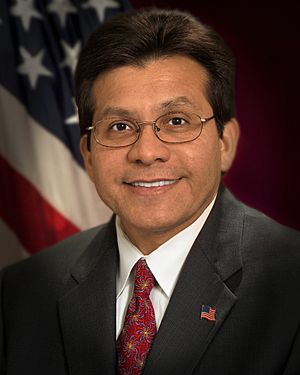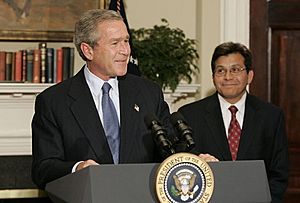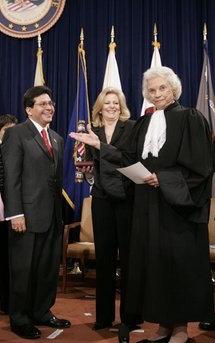Alberto Gonzales facts for kids
Quick facts for kids
Alberto Gonzales
|
|
|---|---|

Official portrait, 2005
|
|
| 80th United States Attorney General | |
| In office February 3, 2005 – September 17, 2007 |
|
| President | George W. Bush |
| Deputy | James Comey Robert McCallum Jr. (acting) Paul McNulty Craig S. Morford (acting) |
| Preceded by | John Ashcroft |
| Succeeded by | Michael Mukasey |
| White House Counsel | |
| In office January 20, 2001 – February 3, 2005 |
|
| President | George W. Bush |
| Preceded by | Beth Nolan |
| Succeeded by | Harriet Miers |
| Justice of the Supreme Court of Texas | |
| In office January 3, 1999 – January 20, 2001 |
|
| Appointed by | George W. Bush |
| Preceded by | Raul Gonzalez |
| Succeeded by | Wallace B. Jefferson |
| 100th Secretary of State of Texas | |
| In office January 1, 1998 – January 3, 1999 |
|
| Governor | George W. Bush |
| Preceded by | Tony Garza |
| Succeeded by | Elton Bomer |
| Personal details | |
| Born | August 4, 1955 San Antonio, Texas, U.S. |
| Political party | Republican |
| Spouses | Diana Clemens (div. 1985) Rebecca Turner |
| Children | 3 |
| Education | Rice University (BA) Harvard University (JD) |
| Military service | |
| Allegiance | |
| Branch/service | |
| Years of service | 1973–1975 |
Alberto R. Gonzales (born August 4, 1955) is an American lawyer who served as the 80th United States Attorney General. The Attorney General is the top lawyer and law enforcement officer for the U.S. government. He held this job from 2005 to 2007 under President George W. Bush. At the time, he was the highest-ranking Hispanic American ever in the executive branch of the U.S. government.
Before becoming Attorney General, Gonzales held several other important jobs. He was the White House Counsel, which means he was the main lawyer for the President. He was also a justice on the Supreme Court of Texas and the Secretary of State of Texas.
His time as Attorney General was filled with controversy. This was mainly because of government actions after the September 11 attacks. People debated the legality of government surveillance and the use of "enhanced interrogation techniques" on suspected terrorists. Many people later said these techniques were a form of torture. Gonzales also faced criticism for the firing of several U.S. attorneys, which some people felt was for political reasons. He resigned in 2007.
After leaving the government, Gonzales worked as a teacher and lawyer. He is currently the dean of Belmont University College of Law in Nashville, Tennessee.
Contents
Early Life and School
Alberto Gonzales was born in San Antonio, Texas, and grew up near Houston. His parents were Mexican American. He was the second of eight children. His father was a construction worker, and his mother raised the children at home. The family lived in a small, two-bedroom house that his father helped build.
Gonzales was a good student in high school. In 1973, he joined the United States Air Force. He later attended the United States Air Force Academy but left to go to Rice University. He graduated with a degree in political science in 1979. After that, he earned a law degree from the prestigious Harvard Law School in 1982.
Starting His Career
After law school, Gonzales worked as a lawyer for a large law firm in Houston called Vinson and Elkins. He became one of the first Hispanic partners in the firm's history.
In 1994, his career in government began when he became the main lawyer for George W. Bush, who was the Governor of Texas at the time. Governor Bush later appointed him to other important roles. In 1997, he became the Secretary of State of Texas. In 1999, he was appointed as a justice on the Texas Supreme Court.
Working for President Bush
When George W. Bush became president in 2001, he asked Gonzales to come to Washington, D.C. Gonzales became the White House Counsel, the president's top lawyer. He was the first Hispanic person to hold this job.
The Fight Against Terrorism
As White House Counsel, Gonzales was a key figure in forming the U.S. government's legal policies after the 9/11 terrorist attacks. He helped create the legal arguments for the "War on Terror."
One of his most debated actions was a memo he wrote in January 2002. This memo discussed whether captured fighters from Al-Qaeda and the Taliban should be protected by the Geneva Convention, which sets rules for how prisoners of war must be treated. The memo argued that the war on terror was different from traditional wars and that getting information quickly was very important to prevent more attacks.
This led to the approval of "enhanced interrogation techniques." These were harsh methods used to question suspected terrorists. Critics, including human rights groups, argued that these methods were illegal and amounted to torture. The government's use of these techniques became a major source of controversy for Gonzales and the Bush administration.
U.S. Attorney General

In November 2004, President Bush nominated Gonzales to be the U.S. Attorney General. The Attorney General leads the United States Department of Justice. After a debate in the Senate, he was confirmed on February 3, 2005.
His time as Attorney General was marked by several major controversies.
Dismissal of U.S. Attorneys
In 2006, the Department of Justice fired seven U.S. Attorneys. U.S. Attorneys are the top federal prosecutors in their districts. While the president can fire them for any reason, critics claimed these firings were politically motivated. They said the attorneys were fired for not prosecuting political opponents of the Republican party or for being replaced by lawyers more loyal to President Bush.
Gonzales said he was not very involved in the details of the firings. However, documents and emails later showed he had approved the plan. When he testified before Congress, he said he could not recall many details about the events. This led many lawmakers from both parties to lose confidence in him.
NSA Surveillance Program
Another major issue was a secret program by the National Security Agency (NSA). The program allowed the government to listen to international phone calls and read emails of people in the U.S. without a warrant, as long as one person in the conversation was suspected of having ties to al-Qaeda.
This program was very controversial because many believed it violated the U.S. Constitution's protection against unreasonable searches. Gonzales defended the program, saying it was necessary to protect the country from terrorism.
The issue became more complicated in March 2004, before Gonzales was Attorney General. Top Justice Department officials, including acting Attorney General James Comey and a very ill Attorney General John Ashcroft, had legal concerns about the program. Gonzales, who was then White House Counsel, went to the hospital to try to get Ashcroft's approval to continue the program. This event later became a key part of congressional investigations.
Resignation
By 2007, many members of Congress from both the Democratic and Republican parties were calling for Gonzales to resign. They felt he had lost credibility because of his handling of the U.S. attorney firings and his testimony about the NSA program.
President Bush continued to support Gonzales, but the pressure grew. On August 27, 2007, Gonzales announced he would resign. He said he was doing what was "in the best interests of the department." His resignation became effective on September 17, 2007.
Life After Government
After leaving his job, Gonzales faced continued investigations into his actions as Attorney General. He later began a new career in education and law.
In 2009, he started teaching political science at Texas Tech University. In 2011, he became a professor and later the dean of Belmont University College of Law in Nashville, Tennessee. He also worked for a law firm in Nashville.
Gonzales has often spoken about his time in government. He has said he felt he was unfairly blamed for policies that many people disagreed with, and he considers himself a "casualty of the war on terror."
See also
 In Spanish: Alberto R. Gonzales para niños
In Spanish: Alberto R. Gonzales para niños
- George W. Bush Supreme Court candidates
 | Isaac Myers |
 | D. Hamilton Jackson |
 | A. Philip Randolph |


